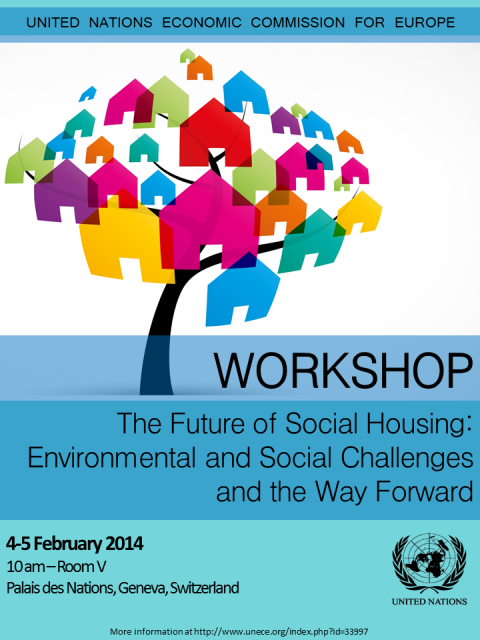
Social housing in Europe is back on the political agenda of UNECE member States. The social housing sector in the majority of European Union member states has been shrinking since the 1980s.[1]
More than thirty years of deregulation and privatisation of the social housing stock in Western Europe and the privatisation of public housing in countries with transition economies have reduced the availability of affordable housing. Austerity measures taken in response to the economic crisis have even further reduced investments in social housing. Despite some recovery programmes in the immediate aftermath of the crisis that included investment measures for the housing sector, many UNECE member States have made cuts in their social housing budgets as part of wider fiscal consolidation programmes. The economic crisis affected many middle-income households, resulting in an increased rate of mortgage defaults and, consequently, homelessness due the lack of supply to meet this increased demand for affordable housing.
On 4 and 5 February 2014, the UNECE Committee on Housing and Land Management, in cooperation with UN-HABITAT and the European Federation of Public, Cooperative & Social Housing (CECODHAS), held a workshop on “The future of social housing: environmental and social challenges and the way forward”. Discussion during this workshop focused on the impact of the global financial crisis on housing affordability, governments’ responses and the challenges that countries are facing at the moment to increase social housing. Among the questions discussed were: different concepts of social housing, provision and financing of social housing; improvement of social cohesion and living conditions; easing energy poverty; and the promotion of environmental sustainability.
The workshop concluded that a stronger government response and the mobilisation of all market participants to address the housing consequences of the global financial crisis are needed. The recommendation of the UNECE International Symposium on Social Housing (Vienna, 2004) is back on the political agenda: this recommendation being for governments to, “develop clear strategies for social and affordable housing which signals to all housing market participants the state's role in supporting it, and what is required from each participant to make this strategy work”. The workshop also agreed that countries need advice on how to develop and implement such strategies.
As an outcome of this workshop, a policy document will be developed, which will provide recommendations to assist member States in addressing their social housing policy challenges.
For more information, please visit: http://www.unece.org/index.php?id=33997
Or contact:
Gulnara Roll
Head, Housing and Land Management Unit
Economic Cooperation, Trade, and Land Management Division
[email protected]
Telephone: +41 (0)22 917 22 57
[1] CECODHAS. 2012. Housing Europe Review. The Nuts and Bolts of European Housing System - http://www.housingeurope.eu/www.housingeurope.eu/uploads/file_/HER%202012%20EN%20web2_1.pdf

